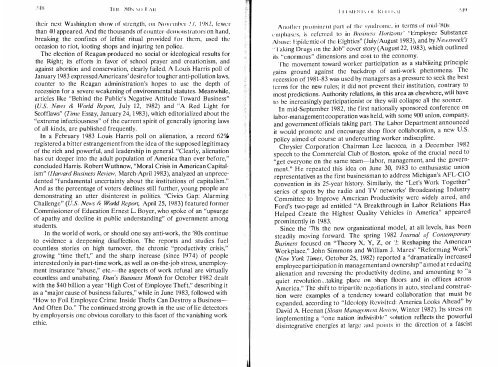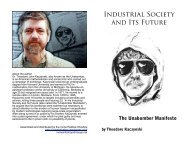CONTENTS - ouroboros ponderosa
CONTENTS - ouroboros ponderosa
CONTENTS - ouroboros ponderosa
You also want an ePaper? Increase the reach of your titles
YUMPU automatically turns print PDFs into web optimized ePapers that Google loves.
Ti ll ' 'xu .... :'-,( ) 1-",\ 1,<br />
their next Washinhton show of strengtil, Oil Novnlliwi .' /, I l )X2, kwe r<br />
than 40 appeared. And thc thousands of counter··dellJollstrators on hand,<br />
breaking the confines of leftist ritual provided for them, used the<br />
occasion to riot, looting shops and injuring ten policc.<br />
The election of Reagan produced no social or ideological results for<br />
the Right; its efforts in favor of school prayer and creationism, and<br />
against abortion and conscrvation, clearly failed. A Louis Harris poll of<br />
January 1983 expressed Americans' desire for tougher anti-pollution laws,<br />
counter to the Reagan administration's hopes to usc the depth of<br />
recession for a severe weakening of environmental statutes. Meanwhile,<br />
articles like "Behind the Puhlic's Negative Attitude Toward Business"<br />
(U.S. News & World Report, July 12, 1982) and "A Red Light for<br />
Scofflaws" (Time Essay, January 24, 1983), which editorialized about the<br />
"extreme infectiousness" of the current spirit of gcncrally ignoring laws<br />
of all kinds, are published frequently.<br />
In a Fcbruary 1983 Louis Harris poll on alienation, a record 62%<br />
registered a bittcr estrangemcnt from the idca of the supposed legitimacy<br />
of the rich and powerful, and leadership in general. "Clearly, alicnation<br />
has cut dceper into the adult population of America than cver before,"<br />
concluded Harris. Robert Wuthnow, "Moral Crisis in American Capitalism"<br />
(Ilarvard Rusiness Review, March-April 1983), analyzed an unprecedented<br />
"fundamental uncertainty about the institutions of capitalism."<br />
And as the percentage of voters declines still further, young people are<br />
demonstrating an utter disinterest in politics. "Civics Gap: Alarming<br />
Challenge" (U.S. News & World Report, April 25, 1983) fcatured former<br />
Commissioner of Education Ernest L. Boyer, who spoke of an "upsurge<br />
of apathy and decline in public understanding" of government among<br />
students.<br />
In the world of work, or should one say anti-work, the '80s continue<br />
to evidence a deepening disaffection. The reports and studies fuel<br />
countless stories on high turnover, the chronic "productivity crisis,"<br />
growing "time theft," and the sharp increase (since 1974) of people<br />
interested only in part-time work, as well as on-the-job stress, unemployment<br />
insurance "ahusc," etc.-the aspects of work refusal are virtually<br />
countless and unabating. Dun's Business Month for October 1982 dealt<br />
with the $40 billion a year "High Cost of Employee Theft," describing it<br />
as a "major cause of business failures," while in June 1983, followed with<br />
"How to Foil Employee Crime: Inside Thefts Can Destroy a Business<br />
And Often Do." The continued strong growth in the use of lie detectors<br />
by employers is onc obvious corollary to this facet of thc vaniShing work<br />
ethic.<br />
i<br />
1.1 I MI·N l, (JI \':'1-1 11',:\\<br />
I\ lIllthl'l prolllim'lIt part Ilf Ihl' sYlidrulIle. ill terms of l1lid··'Os<br />
l'mphaSL"S, is referred to ill Nusincss lIorizons ' "Employee Suhstanc , <br />
Alluse: I ':pidemie of the Eighties" (July/August 1983), and by Newsweek s<br />
"'Taking Drugs on thc Job" coycr story (August 22, 1983), which outhned<br />
its "enormous" dimensions and cost to the economy.<br />
The movement toward worker participation as a stabilizing prmclple<br />
gains ground against the backdrop of anti-work phenomena. Thc<br />
recession of 1981-83 was used by managers as a pressure to seek the best<br />
terms for the new rules; it did not prevent their institution, contrary to<br />
most predictions. Authority relations, in this area as elsewhere, WIll havc<br />
("0 be increasingly participationist or they will collapse all the sooncr.<br />
In mid-September 1982, the first nationally sponsored onfercnc on<br />
labor-management cooperation was held, with some 900 umon, company,<br />
and government officials taking part. The Labor Department announced<br />
it would promote and encourage shop floor collaboration, a new U.S.<br />
policy aimed of course at undercutting worker ,"dISCIphne.<br />
Chrysler Corporation Chairman Lee lacocca, m a December 1982<br />
specch to the Commercial Club of Boston, spoke of the cruCIal necd to<br />
"get cveryone on the same team-labor, management, and the govem<br />
men!." He repeated this idca on June 30, 1983 to enthUSiastIC umon<br />
representatives as the first businessman to addrcss Michigan's AFL-CL






